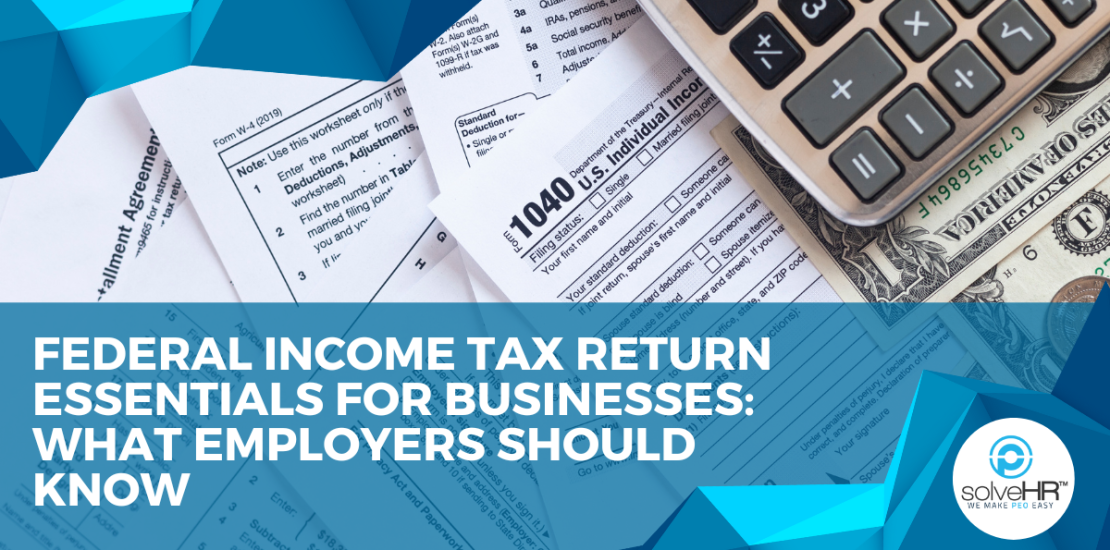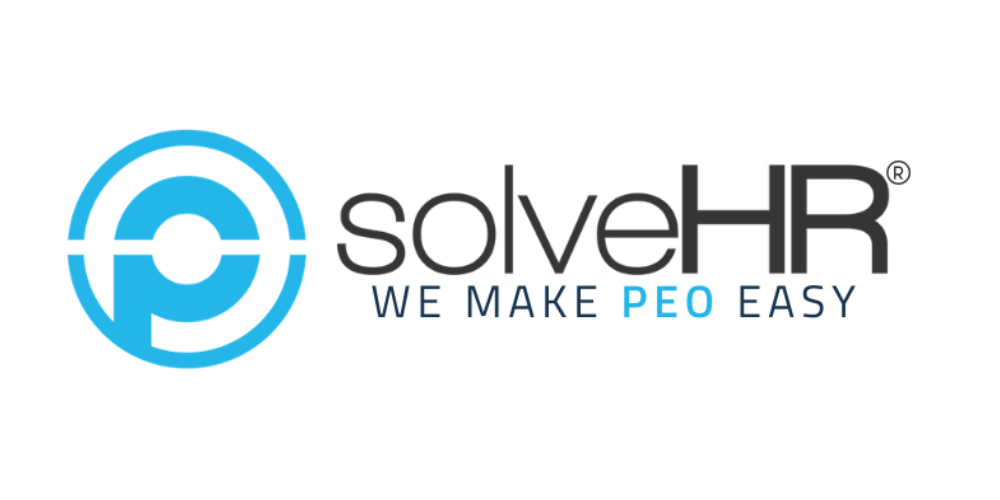Federal Income Tax Return Essentials for Businesses: What Employers Should Know
- 04/09/2025
- Posted by: Matt Muriel
- Category: Uncategorized

As the tax season approaches, businesses need to be well-prepared for filing their federal income tax returns. Navigating the complexities of business tax requirements can be overwhelming, especially with changes in tax law and the unique deductions available to employers. Whether you’re filing as a small business or a larger entity, it’s crucial to understand the essentials of federal tax compliance to avoid costly errors. SolveHR is here to guide you through key considerations for 2025, helping you streamline the process and ensure you’re prepared.
Why Tax Compliance Matters for Your Business
Meeting federal income tax requirements is not just a legal obligation; it’s essential for financial health and long-term growth. Proper tax planning and compliance reduce the risk of audits and penalties, provide valuable financial insights, and help businesses make informed decisions for the future.
Key Tax Return Essentials for Employers
- Identify Your Business Structure and Tax Filing Requirements
- Your tax obligations depend on your business structure—whether you operate as a sole proprietorship, partnership, corporation, or S-corporation. Each structure has different forms and filing requirements, so make sure you know which form applies to your business.
- For instance, corporations file Form 1120, while S-corporations file Form 1120-S. Partnerships use Form 1065, and sole proprietors report business income on their personal Form 1040, Schedule C.
- Gather Essential Documentation
- Having the right documents on hand can simplify the filing process and reduce the chance of missing deductions or credits. Key documents include:
- Income statements and balance sheets
- Payroll records, including Forms W-2 and 1099 for contractors
- Records of deductible expenses, such as office supplies, business travel, and equipment
- Asset records, including purchase and depreciation details
- Having the right documents on hand can simplify the filing process and reduce the chance of missing deductions or credits. Key documents include:
- Understand Business Deductions and Credits
- Taking advantage of deductions can significantly reduce your tax liability. Common deductions include:
- Business Expenses: Expenses like rent, utilities, and office supplies can usually be deducted.
- Employee Benefits: Contributions to employee retirement plans, health benefits, and wellness programs may also be deductible.
- Depreciation: The cost of assets like computers, furniture, and vehicles can be depreciated over their useful life, offering a valuable deduction each year.
- Additionally, credits such as the Research and Development (R&D) credit or the Work Opportunity Tax Credit (WOTC) can help reduce your tax burden if your business meets certain eligibility criteria.
- Taking advantage of deductions can significantly reduce your tax liability. Common deductions include:
- Accurately Report Payroll Taxes
- Payroll taxes, including Social Security, Medicare, and federal unemployment (FUTA) taxes, must be accurately reported on tax returns. Ensure all payments made to employees and contractors are reported correctly, as discrepancies can lead to audits and penalties.
- Make sure to file Forms 940, 941, or 944 for payroll taxes, depending on the size and frequency of your payroll.
- Track Estimated Tax Payments
- Many businesses are required to pay estimated taxes quarterly to avoid penalties for underpayment. Reviewing your estimated payments and reconciling them with your year-end income helps avoid surprises at tax time.
- Businesses typically use Form 1040-ES to report these payments, while corporations use Form 1120-W for their estimated tax payments.
- Review State and Local Tax Requirements
- In addition to federal taxes, you may also have state and local tax obligations. Some states impose their own income tax on businesses, while others may have franchise taxes or sales taxes. Ensure you understand your state’s requirements and include all relevant forms and payments in your planning.
- Consider Hiring a Tax Professional
- Business tax returns can be complex, and any errors can be costly. Partnering with a tax professional or CPA can help you navigate specific deductions, credits, and filing requirements tailored to your industry. Tax professionals can also assist in developing tax strategies that optimize your financial position for the year ahead.
- Business tax returns can be complex, and any errors can be costly. Partnering with a tax professional or CPA can help you navigate specific deductions, credits, and filing requirements tailored to your industry. Tax professionals can also assist in developing tax strategies that optimize your financial position for the year ahead.
Steps to Streamline Your Tax Filing Process
- Organize Your Financial Records Early
- Start organizing your financial records early to reduce last-minute stress. Create a checklist of all necessary documents and forms to ensure you’re fully prepared by the filing deadline.
- Leverage Accounting Software
- Accounting software can simplify tax filing by keeping your records organized throughout the year. Programs like QuickBooks or Xero can generate financial reports, track expenses, and even calculate estimated taxes for your business.
- Stay Informed on Tax Law Changes
- Tax laws can change yearly, impacting your business’s tax obligations. SolveHR can keep you updated on any new federal tax laws that may affect your filings, ensuring you’re aware of any changes that could influence your tax strategy.
- Review Your Deductions and Credits Carefully
- Double-check your deductions and credits to ensure you’re taking advantage of every tax benefit available. Consider all eligible business expenses and confirm with a tax professional that your deductions are accurate and comply with IRS regulations.
- Double-check your deductions and credits to ensure you’re taking advantage of every tax benefit available. Consider all eligible business expenses and confirm with a tax professional that your deductions are accurate and comply with IRS regulations.
How SolveHR Supports Your Tax Compliance
SolveHR understands that tax compliance is a major responsibility for business owners. Our team can assist you in organizing and managing the necessary documentation, ensuring payroll tax accuracy, and connecting you with trusted tax professionals for specialized needs. By helping you stay compliant with federal and state requirements, SolveHR ensures that you’re prepared for tax season while minimizing the risk of costly mistakes.
Tax season doesn’t have to be overwhelming. By understanding the essentials of federal income tax requirements and preparing early, you can file confidently and take full advantage of deductions available to your business. SolveHR is here to support your business every step of the way, from organizing payroll records to staying compliant with changing tax laws. Contact us today to learn how we can help you make tax time a smooth, stress-free process.

